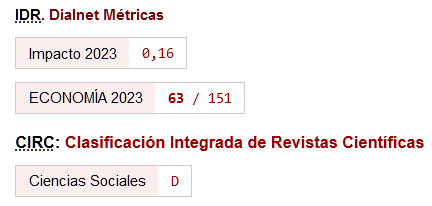'Nobel' Prize 2018. Cost–benefit analysis versus the sustainability principle: the climate change economics of Nordhaus
Keywords:
climate change, cost-benefit analysis, DICE model, Nordhaus, 'Nobel' prizeAbstract
The “Nobel prize in economics” to Nordhaus means the recognition of the Swedish institution to a certain economics of climatic change. His main contribution, the DICE model, models the interrelations between the economy and climate change and determines the "optimal" path of emission reduction that maximizes the present value of the sum of utilities from current and future consumption. The cost–benefit logic is applied to define what to do in the face of climate change, recommending, as a result, a very moderate action that limits the warming to 3.5⁰C, in sharp contrast to the proposals of organisations such as the IPCC. The analysis of Nordhaus incorporates a series of choices regarding methods and parameters based on value judgments and questionable assumptions that completely condition its results and make completely inappropriate to name its prescriptions as the "optimal policy" or as the answer from "economics" to the problem of climate change. The most problematic aspects in his approach refer to the treatment of the future, uncertainty and the application of the cost–benefit logic itself. In contrast to his proposal, we defend that the economic analysis of climate change should take into account the precautionary, sustainability and environmental justice principles.
Downloads
References
Ainslie, G. (1991): "Derivation of 'rational' economic behaviour from hyperbolic discount curves", *American Economic Review (Papers and Proceedings)*, vol. 81, pp. 334-340.
Azar, C. (1998): "Are Optimal CO2 Emissions Really Optimal?", *Environmental and Resource and Energy Economics*, vol. 11, pp. 301-315.
https://doi.org/10.1023/A:1008235326513
Azar, C., Schneider, S.H. (2002): "Are the economic costs of stabilizing the atmosphere prohibitive?", *Ecological Economics*, vol. 42, pp. 73-80.
https://doi.org/10.1016/S0921-8009(02)00042-3
Azar, C., Sterner, T. (1996): "Discounting and distributional considerations in the context of global warming", *Ecological Economics*, vol. 19, pp. 169-184.
https://doi.org/10.1016/0921-8009(96)00065-1
Baranzini, A., van den Bergh, J.C.J.M., Carattini, S., Howarth, R.B., Padilla, E., Roca, J. (2017): "Carbon pricing in climate policy: seven reasons, complementary instruments and political economy considerations", *WIREs Climate Change*, 2017, e462. doi: 10.1002/wcc.462.
https://doi.org/10.1002/wcc.462
Benzion, U., Rapoport, A., Yagil, J. (1989): "Discount rates infered from decisions: An experimental study", *Management Science*, vol. 35, pp.: 270-284.
https://doi.org/10.1287/mnsc.35.3.270
Bergh, J. C. J. M. van den (2004): "Optimal climate policy is a utopia: from quantitative to qualitative cost-benefit analysis", *Ecological Economics*, vol. 48, pp. 385-393
https://doi.org/10.1016/j.ecolecon.2003.10.011
Cline, W.R. (1992): *The Economics of Global Warming*. Institute for International Economics, Washington DC.
Dennig, F., Budolfson, M.B., Fleurbaey, M., Siebert, A., Socolow, R.H. (2015): "Inequality, climate impacts on the future poor, and carbon prices", *PNAS*, vol. 112, n.52, pp. 15827-15832.
https://doi.org/10.1073/pnas.1513967112
Global Carbon Project (2018), *Global Carbon Budget 2018*. http://www.globalcarbonproject.org/carbonbudget/18/presentation.htm
Goulder, L. H., Williams III, R.C. (2012): "The Choice of Discount Rate for Climate Change Policy Evaluation", *Climate Change Economics*, vol. 3, n. 4, 1250024.
https://doi.org/10.1142/S2010007812500248
IPCC (2014): *Climate Change 2014: Impacts, Adaptation, and Vulnerability. Part A: Global and Sectoral Aspects.* Cambridge University Press, Cambridge, Reino Unido.
IPCC (2018): *Global Warming of 1.5°C An IPCC Special Report on the Impacts of Global warming of 1.5°C above Pre-industrial Levels and Related Global Greenhouse Gas Emission Pathways, in the Context of Strengthening the Global Response to the Threat of Climate Change, Sustainable Development, and Efforts to Eradicate Poverty.* IPCC, Ginebra.
Kahneman, D., Krueger, A.B. (2006): "Developments in the measurement of subjective well-being", *Journal of Economic Perspectives*, vol. 20, n.1, pp. 3-24.
https://doi.org/10.1257/089533006776526030
Kalecki, M. (1943): "Political Aspects of Full Employment", *Political Quarterly*, vol. 14, pp. 322-331.
https://doi.org/10.1111/j.1467-923X.1943.tb01016.x
Llavador, H., Roemer, J., Silvestre, J. (2015): *Sustainability in a Warming Planet*, Harvard University Press.
https://doi.org/10.2307/j.ctvjk2xrr
Lowenstein, G. (1987): "Anticipation and the valuation of delayed consumption", *Economic Journal*, vol. 97, pp. 666-684.
https://doi.org/10.2307/2232929
Martínez Alier, J., Roca Jusmet, J. (2013): *Economía Ecológica y Política Ambiental.*, tercera edición, Fondo de Cultura Económica, México, D.F. (Primera edición 2000).
Meadows, D.H., Meadows, D.L., Randers, J., Behrens, W.W. (1972): *The Limits to Growth: A Report for the Club of Rome's Project on the Predicament of Mankind*, Universe Books, Nueva York.
https://doi.org/10.1349/ddlp.1
Nordhaus, W. (1973): "The Allocation of Energy Resources", *Brookings Papers on Economic Activity*, vol. 4, n. 3, pp. 529-576.
https://doi.org/10.2307/2534202
Nordhaus, W. (1975): "The Political Business Cycle", *The Review of Economic Studies*, vol. 42, n. 2, pp. 169-190.
https://doi.org/10.2307/2296528
Nordhaus, W. (1977a): "Strategies for the control of carbon dioxide", *Cowles Foundation discussion paper* n. 443.
Nordhaus, W. (1977b): "Economic Growth and Climate: The Carbon Dioxide Problem", *American Economic Review*, vol. 67, n. 1, pp. 341-346.
Nordhaus, W. (1993): "Rolling the 'DICE': An optimal transition path for controlling greenhouse gases", *Resource and Energy Economics*, vol. 5, pp. 27-50.
https://doi.org/10.1016/0928-7655(93)90017-O
Nordhaus, W. (1994): *Managing the Global Commons: The Economics of Climate Change.* MIT Press, Cambridge MA.
Nordhaus, W. (1997) "Discounting in economics and climate change", *Climatic Change*, vol. 37, pp. 315-328.
https://doi.org/10.1023/A:1005347001731
Nordhaus, W. (2011): "Estimates of the Social Cost of Carbon: Background and Results from the RICE-2011 Model", *NBER Working Paper* n. 17540.
https://doi.org/10.3386/w17540
Nordhaus, W. (2014): "The Perils of the learning model for modeling endogenous technological change", *The Energy Journal*, vol. 35, n. 1, pp. 1-13.
https://doi.org/10.5547/01956574.35.1.1
Nordhaus, W. (2015) "Climate clubs: Overcoming free-riding in international climate policy", *American Economic Review*, vol. 105, n.4, pp. 1339-1370.
https://doi.org/10.1257/aer.15000001
Nordhaus, W. (2018a): "Evolution of modelling of the economics of global warming: changes in the DICE model, 1992-2017", *Climatic Change*, vol. 148, pp. 623-640.
https://doi.org/10.1007/s10584-018-2218-y
Nordhaus, W. (2018b): "Projections and uncertainties about climate change in an era of minimal climate policies", *American Economic Journal: Economic Policy*, vol. 10, n.3, pp. 333-360.
https://doi.org/10.1257/pol.20170046
Nordhaus, W., Boyer, J.G. (1999): *Roll the DICE Again: Economic Models of Global Warming.* Yale University, MIT Press, Cambridge MA.
Nordhaus, W., Tobin, J. (1972): *Is growth obsolete?* Columbia University Press, Nueva York.
Nordhaus, W., Yang, Z. (1996) "A regional dynamic general-equilibrium model of alternative climate-change strategies", *American Economic Review*, vol. 86, pp. 741-765.
Padilla, E. (2002a): *Equidad Intergeneracional y Sostenibilidad. Las Generaciones Futuras en la Evaluación de Políticas y Proyectos.* Colección Investigaciones, n.1/02. Instituto de Estudios Fiscales, Madrid.
Padilla, E. (2002b): "Intergenerational Equity and Sustainability", *Ecological Economics*, vol. 41, n. 1, pp. 69-83.
https://doi.org/10.1016/S0921-8009(02)00026-5
Padilla, E. (2004a): "Climate Change, Economic Analysis and Sustainable Development", *Environmental Values*, vol. 13, n. 4, pp. 523-544.
https://doi.org/10.3197/0963271042772622
Padilla, E. (2004b): "Limitaciones, omisiones y juicios de valor del análisis económico convencional de las políticas de cambio climático. Hacia un análisis coherente con el desarrollo sostenible", *Ecología Política*, n. 28, pp. 121-138.
Pezzey, J. V. C. (2017): "Why the social cost of carbon will always be disputed", *WIREs Climate Change*, DOI: 10.1002/wcc.558.
https://doi.org/10.1002/wcc.558
Pigou, A.C. (1920) *Economics of Welfare.* Macmillan, Londres.
Pindyck, R.S. (2017): "The Use and Misuse of Models for Climate Change", *Review of Environmental Economics and Policy*, vol. 11, pp. 100-114.
https://doi.org/10.1093/reep/rew012
Ramsey, F.P. (1928) "A mathematical theory of saving", *Economic Journal*, vol. 38, pp. 543-559.
https://doi.org/10.2307/2224098
Roca Jusmet, J. (2011): "El debate sobre el crecimiento económico desde la perspectiva de la sostenibilidad y la equidad" en Dubois, A., Millán, J.L. y Roca, J. (coord.), *Capitalismo, desigualdades y degradación ambiental*, Icaria, Barcelona.
Roca Jusmet, J. (2018): "La economía del cambio climático de Nordhaus, premio Nobel 2018", *Ecología Política*, n. 56, diciembre.
Sagoff, M. (1994): *The Economy of the Earth*, Cambridge University Press.
Samuelson, P., Nordhaus, W. (1985): *Economics: An Introductory Analysis.* McGraw-Hill, Boston.
Solow, R. (1974) "Intergenerational Equity and Exhaustible Resources", *The Review of Economic Studies*, vol. 41, pp. 29-45.
https://doi.org/10.2307/2296370
Spash, C.L. (2007): "The economics of climate change impacts à la Stern: Novel and nuanced or rhetorically restricted?", *Ecological Economics*, vol. 63, pp. 706-713.
https://doi.org/10.1016/j.ecolecon.2007.05.017
Stern, N. (2007): *The Economics of Climate Change: The Stern Review.* Cambridge University Press, Cambridge.
https://doi.org/10.1017/CBO9780511817434
Stern, N. (2010): *Managing Climate Change. Climate, Growth and Equitable Development : Inaugural lecture delivered on Thursday 4 February 2010.* Collège de France, París. Disponible en: http://books.openedition.org/cdf/2200.
https://doi.org/10.4000/books.cdf.236
Stiglitz, J. (1974): "Growth with Exhaustible Natural Resources: Efficient and Optimal Growth Paths", *The Review of Economic Studies*, vol. 41, pp. 123-137.
https://doi.org/10.2307/2296377
Strotz, R.H. (1956): "Myopia and inconsistency in dynamic utility maximization", *Review of Economic Studies*, vol. 23, pp. 165-180.
https://doi.org/10.2307/2295722
UNEP (2017): *The Emissions Gap Report 2017.* United Nations Environment Programme, Nairobi.
Wagner, G., Weitzman, M.L. (2016): *Climate Shock: The Economic Consequences of a Hotter Planet.* Princeton University Press, Princeton.
https://doi.org/10.1515/9781400880768
Weitzman, M.L. (2012): "GHG targets as insurance against catastrophic climate damages", *Journal of Public Economic Theory*, vol. 14, n. 2, pp. 221-244.
Downloads
Published
How to Cite
Issue
Section
License
This licence allows third parties to share (copy and redistribute the material in any medium or format) and adapt (remix, transform and create from the material for any purpose, including commercial purposes), provided that authorship and first publication in this journal (The Journal, DOI of the work) is acknowledged, a link to the licence is provided, and it is stated whether changes have been made to the work.







